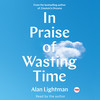Plus, receive recommendations and exclusive offers on all of your favorite books and authors from Simon & Schuster.
Table of Contents
About The Book
We are all worried about wasting time. Especially in the West, we have created a frenzied lifestyle in which the twenty-four hours of each day are carved up, dissected, and reduced down to ten minute units of efficiency. We take our iPhones and laptops with us on vacation. We check email at restaurants or our brokerage accounts while walking in the park. When the school day ends, our children are overloaded with “extras.” Our university curricula are so crammed our young people don’t have time to reflect on the material they are supposed to be learning. Yet in the face of our time-driven existence, a great deal of evidence suggests there is great value in “wasting time,” of letting the mind lie fallow for some periods, of letting minutes and even hours go by without scheduled activities or intended tasks.
Gustav Mahler routinely took three or four-hour walks after lunch, stopping to jot down ideas in his notebook. Carl Jung did his most creative thinking and writing when he visited his country house. In his 1949 autobiography, Albert Einstein described how his thinking involved letting his mind roam over many possibilities and making connections between concepts that were previously unconnected. With In Praise of Wasting Time, Professor Alan Lightman documents the rush and heave of the modern world, suggests the technological and cultural origins of our time-driven lives, and examines the many values of “wasting time”—for replenishing the mind, for creative thought, and for finding and solidifying the inner self. Break free from the idea that we must not waste a single second, and discover how sometimes the best thing to do is to do nothing at all.
Product Details
- Publisher: Simon & Schuster/TED (May 15, 2018)
- Length: 128 pages
- ISBN13: 9781501154379
Browse Related Books
Raves and Reviews
"Our most important human capacities for creativity and our relationships to ourselves and others are under attack by our preoccupation with our devices. We need new practices to turn this around and reclaim our humanity. But here Lightman’s special achievement is to make this familiar story come alive with personal urgency and new clarity. What has for too long seemed like a contentious position is here presented as compassionate common sense. For isn’t it simple common sense to do what will makes us stay human? It is good to hear a call to arms expressed so beautifully. Bravo."
—SHERRY TURKLE, Abby Rockefeller Mauzé Professor of the Social Studies of Science and Technology, MIT, and author of Reclaiming Conversation: The Power of Talk in A Digital Age.
Resources and Downloads
High Resolution Images
- Book Cover Image (jpg): In Praise of Wasting Time eBook 9781501154379
- Author Photo (jpg): Alan Lightman TED(0.1 MB)
Any use of an author photo must include its respective photo credit














